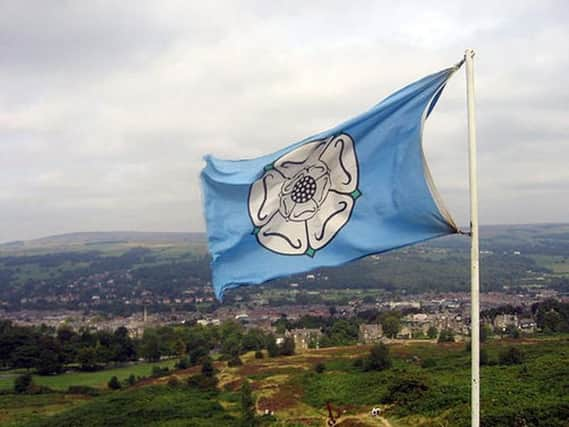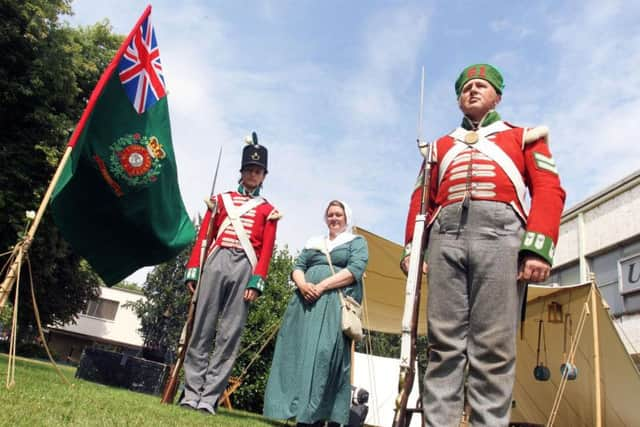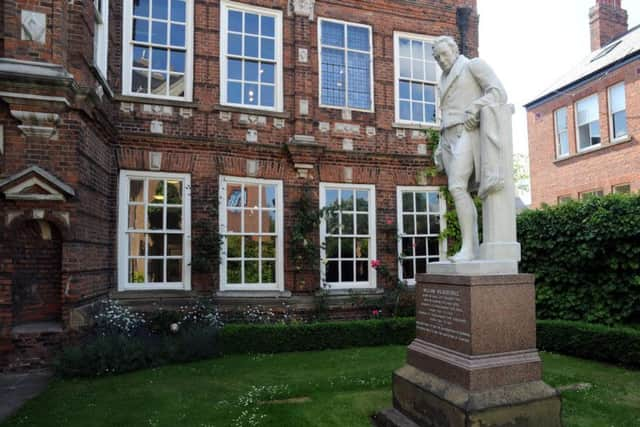YORKSHIRE DAY COUNTDOWN: Slaves and German roses - the story behind our national day


As every proud Tyke knows, next Monday, August 1, is the day when God's Own County can rightfully bask in the glory of being the best place in Britain.
And that's because it is Yorkshire Day - and over the coming week, we'll be celebrating everything that's great about the place we call home.


Advertisement
Hide AdAdvertisement
Hide AdThe people, the places, the history - we're taking a look at them all ahead of next Monday's big celebration.
So why do we have Yorkshire Day - and how did it come about in the first place? Here's the story...
YORKSHIRE DAY - ROOTS IN A PROTEST MOVEMENT
Yorkshire Day, in its current incarnation, was first toasted back in the mid 1970s - not as a celebration of Yorkshire but actually as a protest movement.


Marked for the first time in 1975 in Beverley, the event was held by the Yorkshire Ridings Society as "a protest movement against the Local Government re-organisation of 1974."
Advertisement
Hide AdAdvertisement
Hide AdUnder the act, the traditional Yorkshire Ridings disappeared and administrative counties, county boroughs and their councils were abolished, to be replaced by metropolitan and non-metropolitan counties with vastly changed borders.
The date alludes to the Battle of Minden - and also the anniversary of the emancipation of slaves in the British Empire in 1834, for which a Yorkshire MP, William Wilberforce, had campaigned.
SO WHAT WAS THE BATTLE OF MINDEN?


The Battle of Minden was fought during the Seven Years' War on 1 August 1759. An Anglo-German army under the command of Field Marshal Ferdinand of Brunswick defeated a French army commanded by Marshal of France, Marquis de Contades.
Two years prior, the French had launched a successful invasion of Hanover and attempted to impose an unpopular treaty of peace upon the allied nations of Britain, Hanover and Prussia. After a Prussian victory at Rossbach, and under pressure from Frederick the Great and William Pitt, King George II disavowed the treaty.
Advertisement
Hide AdAdvertisement
Hide AdIn 1758, the Allies launched a counter-offensive against the French forces and drove them back across the Rhine.
After failing to defeat the French before reinforcements swelled their retreating army, the French launched a fresh offensive, capturing the fortress of Minden on 10 July.


Believing Ferdinand's forces to be over-extended, Contades abandoned his strong positions around the Weser and advanced to meet the Allied forces in battle.
The decisive action of the battle came when six regiments of British and two of Hanoverian infantry, in line formation, repelled repeated French cavalry attacks; contrary to all fears that the regiments would be broken.
Advertisement
Hide AdAdvertisement
Hide AdThe Allied line advanced in the wake of the failed cavalry attack, sending the French army reeling from the field, ending all French designs upon Hanover for the remainder of the year.
Prince Ferdinand's army suffered nearly 2,800 men killed and wounded; the French lost about 7,000 men.
SO WHAT'S THE YORKSHIRE CONNECTION?
In Britain, the result at Minden was widely celebrated and was seen as part of Britain's Annus Mirabilis of 1759 also known as the "Year of Victories."


Among the British regiments which fought at Minden were the 51st Foot (King's Own Yorkshire Light Infantry), now part of The Rifles - hence the Yorkshire connection. The descendents of this units and others who fought are still known as "the Minden Regiments."
Advertisement
Hide AdAdvertisement
Hide AdWhen the British infantry were first advancing to battle, they passed through some German gardens and the soldiers picked roses and stuck them in their coats. In memory of this, each of the Minden regiments marks 1 August as Minden Day. On that day the men of all ranks wear roses in their caps with members of the Rifles wearing Yorkshire white roses.
Every year from 1967 to 2015, six red roses have been anonymously delivered to the British consulate in Chicago on 1 August.
A note that comes with the roses lists the six regiments and says, "They advanced through rose gardens to the battleground and decorated their tricorne hats and grenadier caps with the emblem of England.
These regiments celebrate Minden Day still, and all wear roses in their caps on this anniversary in memory of their ancestors." The Embassy has asked for the name of the sender (on numerous occasions) so that they may thank the individual in person, but the identity of the donor remains a mystery.
AND WHAT'S THE WILLIAM WILBERFORCE CONNECTION?
Advertisement
Hide AdAdvertisement
Hide AdHull-born MP William Wilberforce was an English politician and a leader of the movement to abolish the slave trade. He headed the parliamentary campaign against the British slave trade for twenty years until the passage of the Slave Trade Act of 1807.
In later years, Wilberforce supported the campaign for the complete abolition of slavery, and continued his involvement after 1826, when he resigned from Parliament because of his failing health. That campaign led to the Slavery Abolition Act 1833, which abolished slavery in most of the British Empire; Wilberforce died just three days after hearing that the passage of the Act through Parliament was assured. The Act commenced on 1 August 1834 - hence its link with Yorkshire Day.
WHAT HAPPENS NOWADAYS?
A central tradition of Yorkshire Day is the reading of the Yorkshire Declaration of Integrity, which affirms Yorkshire's ancient foundation in 875 AD as the Kingdom of Jorvik by the Viking chief Halfdan Ragnarsson.
The declaration is: "I, (name), being a resident of the (West/North/East) Riding of Yorkshire (or City of York) declare: That Yorkshire is three Ridings and the City of York, with these Boundaries of (current year minus 875) years standing; That the address of all places in these Ridings is Yorkshire; That all persons born therein or resident therein and loyal to the Ridings are Yorkshiremen and women; That any person or corporate body which deliberately ignores or denies the aforementioned shall forfeit all claim to Yorkshire status.
Advertisement
Hide AdAdvertisement
Hide Ad"These declarations made this Yorkshire Day (year). God Save the Queen!"
In York, the Declaration is made four times by the Yorkshire Ridings Society, once for each Riding and once for the City of York. The traditional boundaries of the Three Ridings run up to the ancient city walls, so by processing out of three of the bars (gatehouses) the Society can make the Declaration in each Riding, followed by reading the Declaration within a fourth bar inside the City.
Each year, a Yorkshire town or city is chosen to officially host Yorkshire Day. This year the duty falls to Halifax with the Town Hall flying the flag and staging the celebrations.
Last year, Doncaster hosted the event and among others to have staged it are Huddersfield (1998), Leeds (2004), Bradford (2005) and Scarborough (2012).